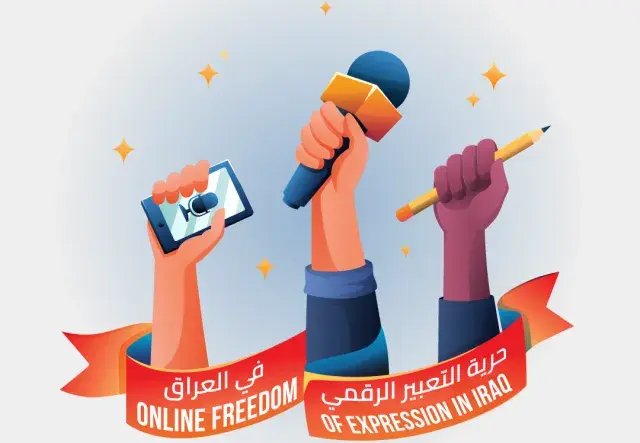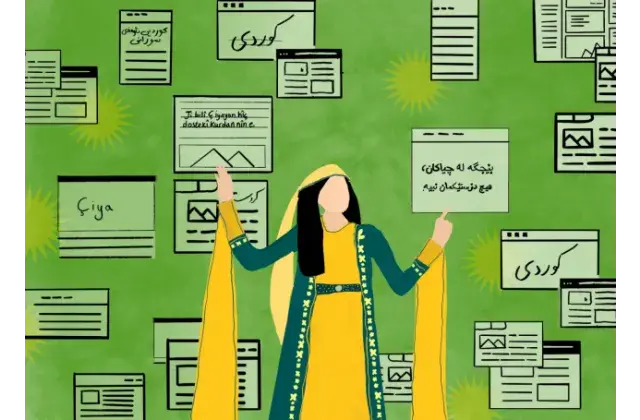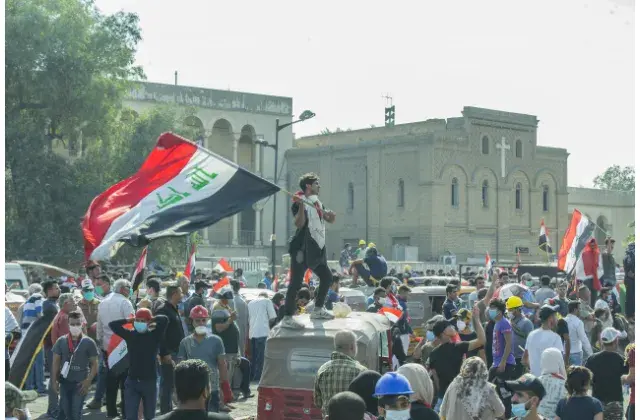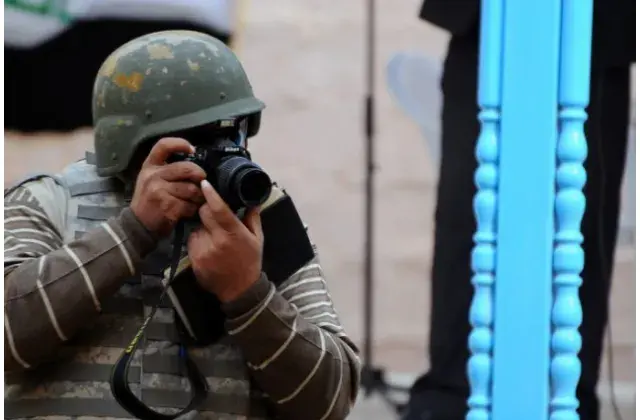Freedom Of Expression Online In Iraq

Executive Summary
The right to freedom of expression is a crucial component of democratic societies. In Iraq, preserving and advancing freedom of expression is pivotal for fostering a democratic society and supporting social and economic progress. It is important to involve citizens in the decision-making process and have all voices represented and heard. Nevertheless, obstacles to freedom of expression in Iraq persist.
This policy brief provides an overview of the current regulations regarding online freedom of expression in Federal Iraq and the Kurdistan Region of Iraq (KRI), as well as the challenges facing the country in this regard. These challenges encompass restrictive laws, violence, harassment, and censorship aimed at journalists and activists by both state and non-state actors. Additionally, the rapid spread of misinformation, disinformation, and mal-information is exacerbating the information disorder in Iraq, which is also of growing concern.
To overcome these challenges, Iraq must take measures to revoke or amend laws that impede freedom of expression, shield journalists and activists from intimidation and harassment, bolster independent media, combat censorship and violence by non-state entities, and foster online freedom of expression.
Introduction
Freedom of expression is a fundamental human right that is essential for the functioning of a democratic society. Article 19 of the Universal Declaration of Human Rights (UDHR) stipulates that:
"Everyone has the right to freedom of opinion and expression; this right includes freedom to hold opinions without interference and to seek, receive and impart information and ideas through any media and regardless of frontiers."
Article 19 of the International Covenant for Civil and Political Rights (ICCPR), which Iraq ratified in 1971, clarifies that this includes the
"freedom to seek, receive and impart information and ideas of all kinds, regardless of frontiers, either orally, in writing or in print, in the form of art, or through any other media of his choice."
Freedom of expression enables people to express their thoughts, views, and ideas without fear of retaliation. The open interchange of ideas and information is necessary for democratic societies for informed decision-making, public engagement, and accountability. The effective implementation of the right to freedom of expression means that individuals can engage in public dialogue, hold their elected officials accountable, and the media can operate as a watchdog, offering factual and impartial information on critical subjects. Online freedom of expression plays a crucial part in this, as people use the internet to share information and ideas, organise for social and political change, and connect with others who share their interests. While it is common for there to be regulations which governments use to monitor online content and prevent illegal activity, other policies and laws are sometimes used to limit freedom of expression to such an extent that they violate international human rights standards.
While the Iraqi Constitution, which was adopted in 2005, includes clauses guaranteeing freedom of expression, a variety of legal and extra-legal obstacles continue to hamper freedom of expression in both the Federal and Kurdistan Region of Iraq (KRI). Those restrictions include existing and draft laws containing vague provisions on freedom of expression, allowing for their arbitrary application and interpretation. In addition, violence, harassment, and censorship continue to be used by both state and non-state actors targeting journalists and activists. As a result, journalists, activists, and others who express dissenting opinions or report on sensitive issues face significant risks, including coercion and legal action.
Challenges To Freedom Of Expression In Iraq
While Iraq's legal framework includes provisions protecting the right to freedom of expression, in practice, freedom of expression is unduly constrained in many ways, including through vague and disproportionate legal restrictions, the intimidation and harassment of journalists and activists, and violence and censorship by state and non-state actors.
Legal Restrictions
Iraq's Penal Code and other laws include provisions that are not in line with international human rights standards related to freedom of expression. For example, the Penal Code contains vague articles, such as articles 225-227 which criminalize defamation and insulting political and religious symbols. These laws restricted otherwise protected speech, such as criticism of public officials and religious leaders. An example of this is the arrest of journalist Sarmad al-Taie on charges of insulting the judiciary in Iraq after he made a statement on live TV criticizing Iraq’s Higher Judicial Council and claiming that Iran influences the Chief Justice. Similarly, articles 401- 404 of the Penal Code allow the arrest of anyone who publishes content against “public decency.” These articles have been used to arrest various online content creators, some of whom have received sentences of up to two years in prison.
The same laws that apply in Federal Iraq also apply to the KRI. However, the KRI has also enacted additional legislation that broadly restricts online content. Such laws have been arbitrarily enforced to unduly limit the right to freedom of expression. For example, citizens can face up to five years in prison for “misusing; their mobile device,” according to articles 2 and 3 of KRI Law No. 6 of 2008 on Preventing the Misuse of Telecommunications Equipment. In the past, the government of Kurdistan has utilised the vague wording of articles in this law to prevent journalists and activists from criticising the government or supporting protests. In 2022 five journalists and activists were sentenced to six-year prison terms due to their coverage and support of anti-government protests.
In addition to the existing laws, legislators frequently discuss draft laws that would further restrict freedom of expression in Federal Iraq and the KRI. For example, legislators in Federal Iraq have been discussing a draft law on combating cybercrimes which include sentences of up to 10 years in prison for posting content that violates “religious or social values.". The Iraqi parliament is also discussing a law on freedom of expression and peaceful assembly, as well as a law on access to information. Both draft laws contain alarmingly vague terminology which would place wide restrictions on freedom of expression.
Similarly, in the KRI, the draft Law on Regulation of Electronic Media in the Kurdistan Region of Iraq is being discussed by parliament. It would allow the government to prosecute dissenting voices for speaking out online by utilising vague and broad terms.
Intimidation, Harassment, And Violence
Journalists, advocates, and sometimes even citizens who discuss sensitive topics or share controversial opinions are often threatened, harassed, attacked and sometimes killed. Some of this violence comes from the government, such as when security forces used indiscriminate and disproportionate force against peaceful protesters and journalists. In other situations, non-state actors like armed groups and militias target journalists and activists who criticise their actions.
For instance, armed groups have used violence to stifle dissenting voices by targeting media outlets and journalists who are critical of their actions. In some areas of the country, armed groups have imposed their own censorship regimes, preventing citizens from accessing information and controlling the narrative in their areas through their own media channels and resources. While at other times, paramilitary groups instigate attacks, for which government authorities nearly never held them to account. For instance, in July 2020, security expert Hisham al-Hashimi was assassinated for daring to criticize the government and affiliated forces. Although one of Hashimi's killers received a death sentence after three years of postponed trials due to political pressure. Others involved in the attack remain free today, evading accountability for their actions.
Furthermore, Iraq has no national policy or legal guidelines on online misinformation, disinformation, or mal-information. Thus, there is no government response when harmful information rapidly spreads through social media. In the context of Iraq, online disinformation and hate speech can have the impact of intimidating and silencing the individuals targeted by the harmful posts and sometimes can even lead to fatal violence. An example of this is the disinformation campaign launched by Iran-backed militias and groups against activist Reham Yaacoub, who was killed by paramilitary forces after they spread false information about her, stating that she had collaborated with the US government.
During that period, the Prime Minister, in response to mounting public pressure, dismissed the Basra Police Chief. However, no one has ultimately been held accountable for the tragic murder.
Censorship
The Iraqi government frequently uses censorship to restrict freedom of expression online so that people cannot share their views on specific political, social, or religious leaders. The Iraqi government and the KRI employ legislation such as Iraq's Penal Code to imprison people who express sentiments against such individuals or organisations. This has created a culture of fear where many citizens refrain from expressing themselves online due to fear of the possible repercussions.
The government of Iraq has also requested Google, META, and Twitter to remove some content from their platforms. Hence increasing censorship, according to reports from Google, META, and Twitter, where some of the reasons were related to defamation or government criticism. Moreover, during the October 2019 protests, unconfirmed photographic evidence and screenshots circulated on the internet indicating that Iraqi government authorities had requested Facebook's intervention in removing certain accounts that were advocating for the protests.
Despite having a constitution that guarantees freedom of expression, in a 2022 report, Freedom House noted that many Iraqis engage in self-censorship due to severe criminal penalties for online content and harassment or intimidation by government officials, political parties, and armed groups.
In addition, government officials arbitrarily block or restrict internet access on various occasions, often without providing justifications or adhering to any legal frameworks, such as a nationwide internet shutdown during exams, to prevent questions from being leaked. The Iraqi government also instigated a full internet shutdown for fifty days during the October 2019 protests to limit demonstrators’ ability to organise and prevent information about the violence carried out against them by state and non-state actors from spreading. Additionally, officials have tried in the past to ban certain content from being used online, such as the video game PUBG and more recently, a decision was taken by the Ministry of Communication to block all websites containing pornographic content on the basis that they do not align with “public morals.”
These dangers to freedom of speech profoundly influence individuals' capacity to partake in public discourse, hold their leaders to account, and contribute to the formation of a democratic society. Journalists, activists, and citizens championing human rights and freedom of speech confront a daunting reality. They are subjected to threats, intimidation, and violence, resulting in a self-censorship climate that stifles public discussions. Compounding these challenges is the absence of strong legal safeguards, widespread corruption, and a need for more transparency. Although some progress has been made through legal reforms and international assistance to promote freedom of speech, a significant amount of work is still required to safeguard and cultivate a culture that genuinely values human rights and the freedom to express oneself in Iraq.
Consequences Of Restricted Freedom Of Expression
Restricting freedom of expression has far-reaching effects that can significantly affect how well a democratic society runs. The following are some effects of limited freedom of expression in Iraq:
Limitations on civic participation and public debate: Citizens are unable to participate fully in the democratic process when they lack the freedom to voice their thoughts or take part in public debate. As a result, fewer ideas and viewpoints may be considered when making decisions, which might result in a lack of accountability and openness in government.
Undermining democratic institutions and the rule of law: freedom of speech is crucial to the operation of democratic institutions and the rule of law. It is more challenging to hold public leaders accountable for their actions when individuals lack the freedom to voice their thoughts or obtain information. As a result, voters' faith in their government may decline, and democratic institutions may lose some of their legitimacy.
Impact on social and economic growth: Limiting free speech can seriously negatively affect social and economic growth. It is more challenging to recognise and address social and economic problems when people lack the freedom to voice their ideas or freely access information. This might prevent advancement in fields like education, healthcare, and economic growth.
Overall, the consequences of restricted freedom of expression are significant and far-reaching. In order to promote the development of a democratic society and support social and economic progress, it is essential to protect and promote freedom of expression in Iraq.
Recommendations For Addressing Challenges To Freedom Of Expression
In order to protect and promote freedom of expression in Iraq, several recommendations should be considered:
Repeal or amend laws that limit free speech: Iraq should evaluate its laws governing free speech and repeal or modify any that are in violation of global human rights norms. This includes laws that prohibit reporting on sensitive subjects by journalists and activists, as well as laws that deal with blasphemy, incitement to violence, and defamation. This can include but is not limited to Iraq’s Penal Code (articles 225 - 227) and (articles 401 - 404).
Ensure the involvement of various stakeholders in legislation drafting processes: Civil society and subject experts must be involved in the process of drafting any legislation, especially those relevant to freedom of expression. Such an inclusive process will ensure that various views are included when laws are drafted and limit dangerous restrictions on freedom of expression.
Protect journalists and activists from harassment and intimidation: Iraq should take precautions to safeguard journalists and activists who are covering sensitive subjects or airing divergent viewpoints. This includes explicitly prohibiting security personnel from unduly interfering with peaceful protests and journalistic activities, holding authorities accountable when they use excessive force against activists and journalists, and pursuing legal action against anybody who threatens or harasses journalists or activists.
Strengthen independent media: Iraq should endeavor to encourage the growth of a dynamic and diversified media sector by strengthening independent media outlets. This involves providing journalists with training and assistance, fostering media literacy, and ensuring that government advertising is disseminated evenly among media sources.
Combat censorship and violence by non-state actors: Iraq should take steps to combat censorship and violence by non-state actors, including armed groups and militias. This includes prosecuting those who engage in violence or censorship and working to support independent media outlets in areas where censorship is prevalent.
Promote freedom of expression online: Iraq should ensure that the internet and social media are accessible and open and that citizens are able to express their opinions and access information without fear of censorship or retaliation. This includes promoting digital literacy and working to combat online harassment and violence.
Overall, protecting and promoting freedom of expression in Iraq is essential to the development of a democratic society and the support of social and economic progress. By taking steps to address the challenges facing freedom of expression, Iraq can support the development of a vibrant and diverse media sector, encourage citizen participation in public discourse, and strengthen democratic institutions and the rule of law.
Conclusion
Freedom of expression is a basic human right and the foundation of democratic societies. Thus, the protection and promotion of free expression in Iraq are critical to the development of a democratic society and the advancement of social and economic growth. However, restrictions on freedom of speech in Iraq remain and are implemented through restrictive legislation, violence, harassment, and censorship of journalists and activists by state and non-state actors.
To address these issues, Iraq should repeal or amend laws restricting freedom of expression, protect journalists and activists from intimidation and harassment, strengthen independent media, combat censorship and violence by non-state actors, and promote freedom of expression online.
Link: https://t4p.co/blog/2023-06-16-freedom-of-expression-online-in-iraq
This article was written by Tech4Peace Organisation and is licensed under CC BY-NC 4.0.
Organisation: Tech4Peace






